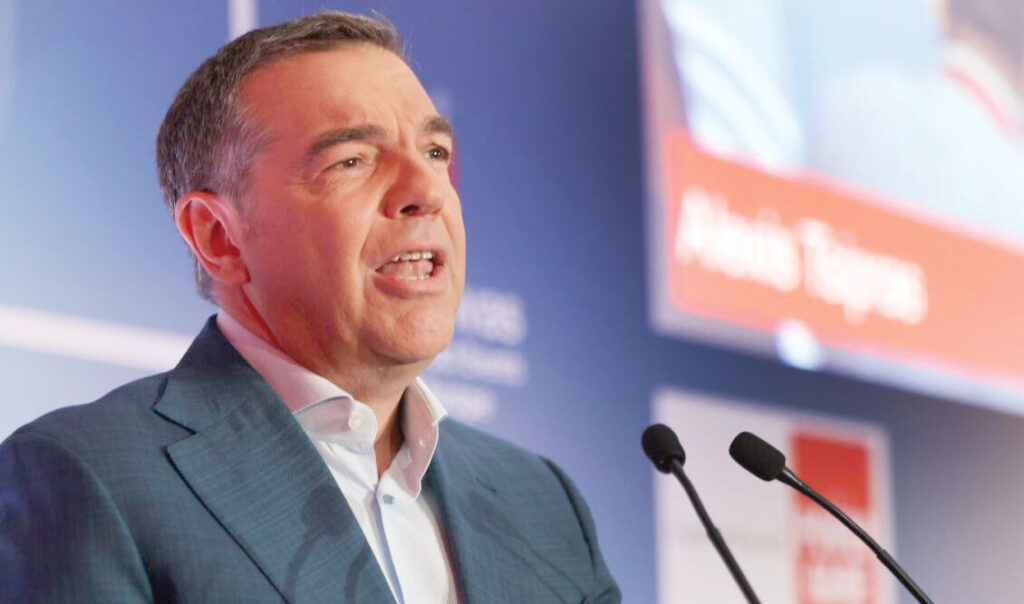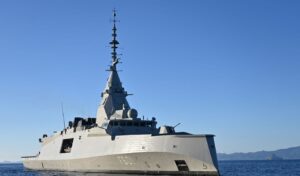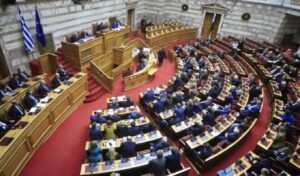“Europe is not a continent without leadership. It is a continent with wrong leadership. Neoconservative, neoliberal, timid and inadequate,” emphasized former Prime Minister Alexis Tsipras at the French university Paris 1 Panthéon-Sorbonne, at an event titled “Europe: A continent without leadership?“. He spoke about the “serious leadership vacuum in the EU” that “undermines Europe’s future” and simultaneously delivered harsh criticism of European Commission President Ursula von der Leyen, NATO Secretary General Mark Rutte, and former French Prime Ministers François Bayrou and Nicolas Sarkozy. “The European Commission operates increasingly authoritarianly,” Mr. Tsipras emphasized.
He focused on the “successive crises that have rapidly strengthened Europe’s far-right and neoconservative forces. They invested in fear and emerged stronger.” He also highlighted the “visible danger that the far-right in France, Germany, Britain, and Italy could lead the most militarized Europe since World War II.” At another point in his speech, the former Prime Minister emphasized: “For the social majority, the left is useful, even more so, and especially I would say, during difficult times. But the left that doesn’t flee when facing difficulties.”
He advocated the following approach: “We must mobilize around a new patriotism for justice in our countries. A new patriotism that is inclusive, ethical, economic, and social. A new patriotism based on the determination to resist the great interests of the powerful and oligarchs. To make them pay. And beyond our countries, we must fight for a new internationalism on both sides of the Atlantic, for peace and against the far-right. And claim European leadership.”
“As our world becomes increasingly unequal, more authoritarian, more violent, we must remember those great values that mobilized peoples and brought about the great revolutions and major changes on our continent,” Alexis Tsipras added.
Alexis Tsipras: excerpts from his speech
-The European Commission operates increasingly authoritarianly. President Ursula von der Leyen was not elected by citizens. She was appointed through backroom deals, bypassing the Spitzenkandidaten process. Most importantly, she doesn’t seem accountable to citizens but to big pharmaceutical and arms multinationals. The result? Disappointment. Dissatisfaction. Crisis of confidence.
-Europe’s inability to inspire or pursue reforms in the face of recurring crises has revealed a serious leadership vacuum and, above all, a vision deficit. These crises undermine Europe’s future and threaten its peoples’ achievements. Meanwhile, European leaders appear as part of the crises rather than part of the solution.
-We’re returning to an era where international law is no longer a reference point. With the US President clearly stating that what matters now in our world is the “right of the strong.”
–The Sorbonne, particularly for the left, holds a special place in our memory and heart. Not only for the high level of education and research you’re known for worldwide. But also because it was precisely this university that, in May 1968, became the symbolic epicenter of French youth’s rebellion against the establishment. I think, however, that not even the May ’68 students, whose slogan was “imagination to power,” could have imagined the evolution of our times. Because what’s happening today on the international stage exceeds all imagination.
-Today we’re again at a turning point in history, but with the wind blowing in the opposite direction – toward authoritarianism, geopolitical insecurity, and extreme inequalities. Where Europe’s central stake is militarization. With social and regional inequalities intensifying. With the wealthy accumulating unprecedented wealth while the majority struggles to cope. Working constantly more but earning increasingly less.
-The far-right is strengthening rapidly. And we must seriously consider what this means. The danger that in a few years, not only Meloni but also Le Pen, along with British and German far-right leaders, could hold leadership positions in the most militarized Europe since World War II. It’s clear that since 2008, we’ve entered an era of multiple and interconnected crises and insecurity. A polycrisis era that led to insecurity and profound questioning of Western states’ ability to protect their citizens.
-From these crises, Europe’s far-right and neoconservative forces, which invested in fear, emerged stronger. They insisted on austerity during the economic crisis, seeking Greece’s expulsion from the Eurozone. They prevented any proposal regarding common European debt, revision of the Stability Pact, or taxation of large corporations to secure European resources. They promoted immigration policies that cancel European solidarity, violate international law, and endanger human lives. They supported national entrenchment with Brexit as the most characteristic result. They undermined the green agenda, seeking either to cancel it or burden the most vulnerable. And they blindly supported American interventions with all their tragic consequences, preventing any discussion of a strong Common Foreign and Security Policy that would make Europe a force for peace and stability.
-In France, the neoliberal policies imposed by the government backfired economically and created deep political instability along with social unrest. I cannot fail to note the irony that former Prime Minister Bayrou, who vehemently criticized my government and promoted his neoliberal views as France’s only salvation, ultimately only managed to create even more instability in his country.
-With all the crises I mentioned, I consider that Europe is returning to interwar conditions: economic crisis, social dissolution, political weakness – with the far-right in the foreground. This grim situation isn’t simply a sign of the times. Nor is it simply a turning point in history. It’s the direct result of the choices made by our continent’s political leaderships.
-To address today’s speech title, my answer is: No, Europe is not a continent without leadership. It is a continent with wrong leadership. Neoconservative, neoliberal, timid and inadequate. Leadership that goes blindly into the rocks.
-In an era when inequalities are widening. As our world becomes increasingly unequal, more authoritarian, more violent, we must remember those great values that mobilized peoples and brought about the great revolutions and major changes on our continent. Equality, liberty – fraternity, as your ancestors proclaimed. Democracy and social justice, values for which many fought in every corner of Europe, where peoples took their fate into their own hands.
-The left in Greece took over governance in an economy that had lost 25% of its GDP, like the US during the Great Depression of 1929, while unemployment was at 26%. That is, in a country facing a humanitarian crisis. However, we managed to bring our homeland out of this crisis, return to growth, restructure its debt so that today it’s protected from international markets. Most importantly, we achieved this while simultaneously protecting the most socially vulnerable.
-For the social majority, the left is useful, even more so, and especially I would say, during difficult times. But the left that doesn’t flee from difficulties. The left that keeps its feet on the ground and doesn’t just protest, denounce and resist, but dares to take responsibility for governance to serve the interests of the many.
-The left is needed to get society and country out of crisis, ensuring that burdens are distributed fairly instead of being shifted to wage earners, young people and pensioners.
As Gabriel Zucman recently proposed, we need a wealth tax adapted to the 21st century
-Against the neoliberal system. But also against the even worse far-right that threatens to replace it, the answer cannot be escape from reality. It is mobilizing our societies. We must mobilize around a new patriotism for justice in our countries. A new patriotism that is inclusive, ethical, economic and social. A new patriotism based on the determination to resist the great interests of the powerful and oligarchs. To make them pay. And to claim European leadership.
-Let’s revive today the old slogan of May ’68: We are realists, we demand the impossible. And stand against the attempt by dominant elites and political leaderships to decide themselves what is impossible.




